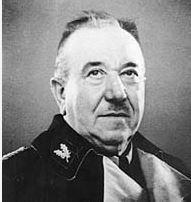Karl Maria Wiligut

🕯️ Who Was Karl Maria Wiligut?
-
📅 Lifespan: 1866–1946
-
🛡️ Background: Austrian military officer (reached the rank of colonel in WWI), later self-proclaimed occultist and clairvoyant.
-
🧙♂️ Also known as: Weisthor – his mystical alter ego.
🧠 Wiligut’s Beliefs & Mythology
Wiligut claimed to possess ancestral memory, going back thousands of years. He believed he descended from a line of god-kings and had access to a secret ancient Germanic religion, older than Christianity and even older than mainstream Norse mythology.
According to Wiligut:
-
There was once a Germanic sun religion dating back 228,000 years.
-
His ancestors had magical powers and wisdom far beyond modern comprehension.
-
He mixed esoteric Christianity, Norse myth, and Aryan mysticism into a bizarre spiritual system.
Basically, a fantasy world disguised as history, fueled by racial mysticism and personal delusion.
🛑 Nazi Connection
This is where it gets unsettling.
-
In the 1930s, Wiligut was brought into the SS by Heinrich Himmler, who was obsessed with occultism and Germanic heritage.
-
He became the spiritual adviser to Himmler and was involved in designing rituals, interpreting symbols, and shaping the "mythic" vision of the SS.
-
Wiligut had a role in turning Wewelsburg Castle into a kind of SS spiritual headquarters — complete with Black Sun symbolism, Grail myths, and ritual chambers.
🧬 Downfall and Institutionalization
-
Despite his powerful position, Wiligut's mental health and bizarre claims caught up with him.
-
He was eventually institutionalized for dementia and mental illness (this had also happened earlier in his life, before the Nazi era).
-
By 1939, he was pushed out of the SS. He died in 1946, forgotten by many, but later rediscovered by post-war occult and neo-Nazi groups.
⚠️ Legacy
Wiligut remains a deeply controversial figure, studied by:
-
Scholars of esotericism and Nazi mysticism
-
Neo-pagan or occult circles (some fringe, some critical)
-
Conspiracy theorists and writers on secret societies
He is not honored in the Walhalla Memorial—and never would be. His influence, while real in the Nazi regime’s myth-making, is now mostly seen as a cautionary tale of how myth, nationalism, and delusion can be weaponized.

